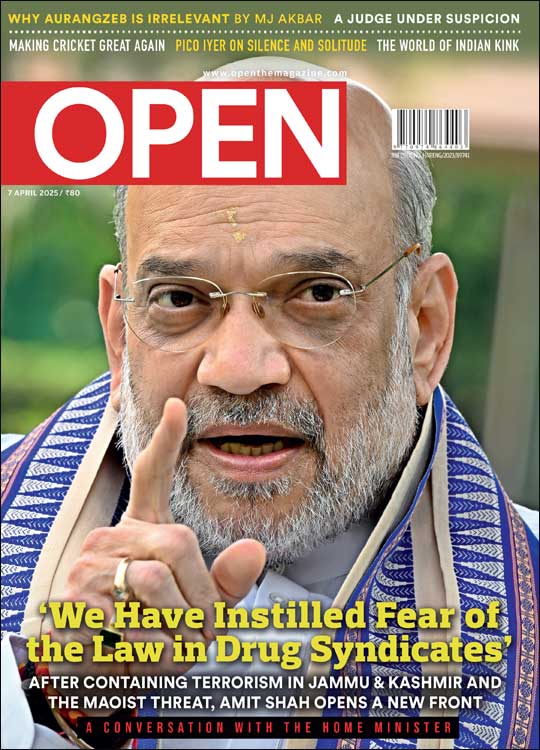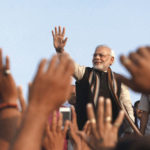Hindu Belief: Legacy versus Destiny
For Indology to overcome its past prejudices, it must open itself to the perspectives of genuine Hindu belief
 Murali Balaji
Murali Balaji
 Murali Balaji
|
03 Sep, 2015
Murali Balaji
|
03 Sep, 2015
/wp-content/uploads/2016/01/19496.legacydestiny1a.jpg)
In 1855, German Indologist Albrecht Weber wrote to the Prussian minister of culture on the benefits of continued investment in the study of classical Indian traditions, arguing that only he and his brethren could shed light on what was previously ‘dark’ to the rest of the world. By studying the Vedas, Weber argued, Germans could help liberate Indians from their uncivilised way of being. He wrote: ‘The entire weight of the religious and cultural structure of contemporary India appears to rest on the Vedas. As soon as they are unveiled from the mysterious darkness surrounding them till now, and made accessible to all, all the untruths shall be automatically revealed, and this shall, in time, put an end to the sorry plight of religious decadence in India.’
Along those lines, Adolph Holtzmann Jr, one of the most prominent Indologists of the early 20th century, noted that the ‘authentic’ Indo-Germanic ideal of The Mahabharata had been corrupted by Brahmins, whom he considered devious. He wrote, ‘How much Brahmanism with its sophistic approach damaged the old, healthy, and potentially further developable morals of the Indians and twisted their concepts of right and wrong… In place of morals and religion entered rituals and salvation through works from the time of the Brahman restoration down to our times.’
Beyond the hostility towards Indian ways of thinking and their inherent presumption that Indian classical texts were wrongs that could only be righted by them, the German Indologists of the 19th and early 20th century defined Indian philosophy as simply incapable of being viewed as living traditions. To Weber, Holtzmann and many like them, Indian—primarily Hindu—philosophy was to be treated as a (corrupted) relic of the past, devoid of its humanistic value and stripped of its praxis in daily life, and only they—not Indians—could authenticate it. As Vishwa Adluri and Joydeep Bagchee argue, ‘German Indologists… had accomplished something Jesuit missionaries over generations had struggled to do: they had found a way to make Hindu theology—at least from the perspective of those who were always already saved—redundant.’
More than a century later, Indology as a field hasn’t fully escaped or even acknowledged that past—one peppered gratuitously over the years with racism, made-up interpretations of canonical texts, and suspicion towards native commentaries on philosophies and practices—and is now paying a price in terms of its credibility. While the American and Indian media have often tried to frame Indology’s struggles as a battle between scholars and right-wing Hindu activists or one of the Left versus the Right, such dichotomies are exaggerated or altogether false.
The issue is more of who gets to speak for India’s cultural and spiritual history, and the validity given to those who attempt to speak for it. While India is home to many religious and spiritual traditions, which are reflected in its Diaspora, most of Indology’s focus has been on Hinduism (or Hinduisms, as some scholars are wont to argue). It’s nothing new to assert that Hinduism and the expanse of Hindu practices have largely been interpreted by its Others, but what might be more compelling to note is that contemporary Indology has been unable to wholly rid itself of the hostility with which its forbearers viewed Hinduism and Indian spirituality. In the case of Hinduism, its Others have created such an intractable narrative that it has become both the way Hinduism is defined and how many Hindus often and inadvertently define themselves.
Adluri and Bagchee’s The Nay Science (a clever play on nescience, or ignorance) speaks to the institutional antagonism of 19th and early 20th century German Indologists towards ancient Indian scriptures, subsequently shaping a paradigm from which many Indologists continue to draw. Their assertion, backed by correspondences between Indologists and their own published works, is not so much a critique of Orientalism as it is a surgical evisceration of the scholarly field that has developed over nearly two centuries. Adluri and Bagchee meticulously detail how German Indologists were on a quest, guided by their own half-cocked and often inane interpretations of texts such as the Bhagavad Gita, to define their own history. As such, German Indologists advanced the idea of a separate Indo- Germanic martial race (of Aryans, as they would label them) whose former glory had been corrupted through revision by spiteful Brahmins and racial mixing with ‘indigenous’ Indians (popularly referred to later as Dravidians).
Sadly, what these Indologists created without any evidence (or even travel to India, for that matter) was a set of false assertions that would for years define Hinduism and ancient India, including but not limited to claims that: a martial Aryan race brought the Vedas with them from Germany; ancient ‘Indo- Germanic’ texts such as the Mahabharata and Bhagavad Gita were re-written to fit Brahmanical dominance (which would have been to presume that Brahmins were somehow a united cabal or wielded that much power); and that Krishna was deified in order to unite Hindus against the rise of Buddhism.
What Adluri and Bagchee show isn’t just how the prominent Indologists of the previous century created a history of India that never existed, but how their views became sacrosanct as they were passed down. The Nay Science is arguably one of most comprehensive historiographies of Indology, assessing the field’s philosophical roots and the implications it has had on both academic and practical discourses about Hinduism and other Indian classical traditions.
To be sure, Indology is a diverse, sprawling field that includes the study of Sanskrit (and other ancient Indic languages such as Tamil), cultural and social history, archaeology, philosophy and anthropology. It encompasses the study of the traditions of Hindus, Buddhists, Jains, Sikhs, Zoroastrians (and to a lesser degree, Muslims), though Hinduism makes up a prominent portion of Indological scholarship. It should be noted that there are a growing number of Indologists who approach their areas of study with empathy rather than suspicion, and a cadre of younger scholars who are slowly replacing older ones as prominent voices. However, despite these changes, the field as a whole has never been able to come to terms with its racist past, particularly in its systematic dismissal of the indigenous point of view.
This might be partly due to the fact that Indology has long been dominated by non-Indians and non-Hindus, whose readings of texts eschew or even belittle indigenous commentaries. Many of these scholars assert that their unwillingness to incorporate these commentaries (such as those done by Madhvacharya or Adi Shankara) is an attempt to maintain objectivity. Some of the same Indologists have argued that their schooling and methodologies privilege them over the interpretations of those who don’t have similar backgrounds, positioning many Indologists as adversaries of the very groups they are supposedly writing about/for. It’s about as ridiculous as having an all-White African-American Studies department at an American university, an all-male women’s studies department, or a foreign language department dominated by non- native speakers.
The notion of objectivity is deeply problematic because it presumes that positivism is the preferred approach to understanding human behaviour. But the stories in Hindu (and Buddhist and Jain) scriptures were not meant to be read with a positivist approach, and they certainly were not meant to be taken literally. Moreover, while Hindu texts are friendly to hermeneutics, they have too often been subjected to what Adluri and Bagchee point to as ‘the hermeneutics of suspicion’, which has been an attempt by some non-Hindu, non-Indian scholars such as Wendy Doniger to say that authentic Hindu texts (raw and playful in her opinion) can only be found by scholars trained in the Western tradition. As cultural studies scholar Sean J McGrath claims, the hermeneutics of suspicion, drawing heavily from 20th century neo-Marxist intellectual Theodor Adorno and his colleagues at the Frankfurt School, is ‘necessary when reason is not in command of the discourse but is the product of ‘false consciousness.’ The most explicit example of how this works is classical psychoanalysis.’ To put it bluntly, many Indologists simply don’t trust Indian interpretations of texts because they believe Indians inherently lack the capacity to understand the true meaning of their own scriptures.
Perhaps this is why many Hindu scholars (who are not Hindutvadis, as Doniger calls them) take exception to the psychoanalytical approaches to Hindu texts applied by academics such as Doniger or Jeffrey Kripal. Such approaches presume that practitioners and philosophers alike were somehow blind to the actual meaning of Hindu stories for centuries until their eyes were opened by Western scholarship. In fact, the sensual, erotic and homosexual aspects of Hindu scriptures (which should be made more prominent in contemporary discourse) have been captured very well—sans the hermeneutics of suspicion— by non-academic writers such as Devdutt Pattanaik in a much more holistic and empathetic manner than Western academics such as Doniger have been able to.
As I have previously argued, there’s nothing inherently wrong about scholars taking liberties with how they interpret texts, but it should be worth noting that these interpretations should never be seen as the correct way of approaching or understanding Hinduism, or mistaken as readings found in Hinduism as it has been lived. However, because of the dominance of the hermeneutics of suspicion in contemporary Indology, as well as its past allegiance to racialised or Orientalised approaches to Indian classical traditions, there has simply been little to no robust counter-narrative within academia. These approaches have also foiled Hindus in their ability to constructively define themselves within India and across the globe. In many ways, the indigenous Hindu perspective in academia mirrors the aspirations of the feminist writer Audre Lorde, who said, “If I didn’t define myself for myself, I would be crunched into other people’s fantasies for me and eaten alive.”
Indology’s institutional failure to accept critique and incorporate indigenous perspectives has simply made new and innovative— and empathetic—scholarship harder to come by. In a field dominated by not just what one writes, but who they cite, many ideas and assertions are just differently worded replications of previously published works. This is why Adluri and Bagchee’s analysis is so stinging: it uses Indology’s own assertions to turn it on its head.
The stagnancy of Indology hasn’t just deprived academics the opportunity to move away from previous paradigms. It has also fomented a deep distrust among some Hindu Indians towards academic institutions, a distrust fuelled by a cottage industry of crackpots whose own interpretations about an idealised Hindu way of life have been embraced by some Diaspora Hindus desperate to find an alternative to what they see as Hinduphobic interpretations of their texts.
Again, Indology has to be held accountable for that, too. The field’s lack of reflexivity, and its institutional unwillingness to provide space for indigenous interpretations and commentaries, is shackling it, even as interest in classical Indian traditions grows worldwide. As Adluri and Bagchee note:
‘Given that Indology has only been able to think of Indians in terms of stereotypes such as flying carpets and yogis, it is unthinkable that it would seriously strive to find some link or access to the Indian tradition. …since Indology’s claim to superiority over the classical Indian tradition has rested on its claim that it alone is not indebted to history—that it alone has transcended the elementary conditions of historical being to attain pure objectivity— it cannot now acknowledge that its perspective, too, is historically conditioned, unless it is willing to accept the problems with past scholarship. But, as we know, Indology is far from taking up critical relation to its past. Indeed, even at the price of sheltering Nazis, German Indologists are unwilling or unable to accept a critical reflection on the history of German Indology.’
Adluri and Bagchee highlight the hypocrisy of a field that has produced volumes of critique on Hinduism and Indian thought, yet is paralysed by inertia and intransigence when it comes to even the slightest bit of self-critique. Perhaps this is why, rather than devoting enormous energy reproducing deconstructionist approaches to Hinduism and ancient Indian classical traditions, Indologists might be better served by undertaking a thorough self-examination of the field’s development in the form of critique. It would be useful to at least try to understand—and engage—critiques from outside academia; as such attempts might actually lead to new ways of knowledge creation.
Acknowledging the sins of the past and slowly but surely distancing themselves from a lineage of nescience, Indology can re-invent itself to become a better bridge between the academic and the sacred. In fact, prominent academics such as Anantanand Rambachan and Jeffery Long have called for this sort of self-examination and paradigm shift. Additionally, some recent works, such as Andrew Nicholson’s Unifying Hinduism, provide a strong counter-argument to deconstructionist approaches to Hinduism. In their book, Adluri and Bagchee highlight how Gandhi’s use of the Gita in praxis—and his use of ancient commentaries on the text— helped in tying together its moral lessons with the daily struggle of Indians (and Gandhi was obviously not an Indologist). If anything, The Nay Science should help move the discussion on Indology’s need to be reflexive and more embracing of indigenous perspectives from the realm of the abstract to the realm of action.
If The Nay Science does indeed foment an academic revolution within Indology, perhaps contemporary Indologists can do what their philosophical forbears were unable to over a century ago: acknowledge that there’s validity and value to embracing the voice of the indigenous.
About The Author
CURRENT ISSUE
‘We Have Instilled Fear of the Law in Drug Syndicates,’ says Amit Shah
MOst Popular
4

/wp-content/uploads/2025/03/Cover_Amit-Shah.jpg)











More Columns
Elon Musk attracts sharp attack over ‘swastika’ from Indians on social media Ullekh NP
Yunus and the case of a "land locked" imagination Siddharth Singh
Why CSK Fans Are Angry With ‘Thala’ Dhoni Short Post